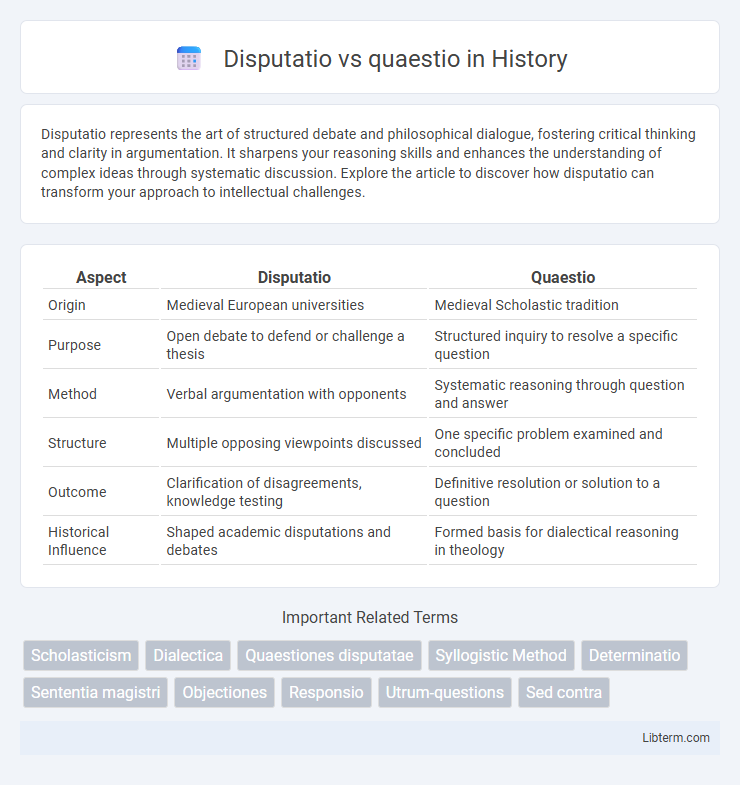Disputatio represents the art of structured debate and philosophical dialogue, fostering critical thinking and clarity in argumentation. It sharpens your reasoning skills and enhances the understanding of complex ideas through systematic discussion. Explore the article to discover how disputatio can transform your approach to intellectual challenges.
Table of Comparison
| Aspect | Disputatio | Quaestio |
|---|---|---|
| Origin | Medieval European universities | Medieval Scholastic tradition |
| Purpose | Open debate to defend or challenge a thesis | Structured inquiry to resolve a specific question |
| Method | Verbal argumentation with opponents | Systematic reasoning through question and answer |
| Structure | Multiple opposing viewpoints discussed | One specific problem examined and concluded |
| Outcome | Clarification of disagreements, knowledge testing | Definitive resolution or solution to a question |
| Historical Influence | Shaped academic disputations and debates | Formed basis for dialectical reasoning in theology |
Introduction to Medieval Scholastic Methods
Disputatio and quaestio are foundational methods in medieval scholasticism, shaping intellectual inquiry in the Middle Ages. Disputatio involves structured debate where opposing arguments are presented and refuted, fostering critical thinking and dialectical reasoning. Quaestio focuses on posing precise questions followed by systematic analysis and resolution, exemplifying the methodical approach to theology and philosophy characteristic of scholastic education.
Defining Disputatio: Structure and Purpose
Disputatio is a formal method of dialectical argument used in medieval scholasticism, characterized by a structured debate involving a thesis, objections, and replies. Its purpose is to clarify complex theological or philosophical issues by rigorously examining opposing viewpoints through systematic questioning. This method contrasts with quaestio, which functions as a broader inquiry format focused on problem-solving without the strict argumentative framework found in disputatio.
Understanding Quaestio: Meaning and Framework
Understanding quaestio involves grasping its role as a structured method of inquiry that frames a specific question within a logical and philosophical context, guiding systematic investigation and debate. Unlike disputatio, which emphasizes argumentative exchange and refutation, quaestio centers on defining, analyzing, and resolving issues through detailed examination of premises and evidence. This framework facilitates clear problem identification and methodical exploration, essential for scholarly dialogue in medieval and classical scholastic traditions.
Historical Origins of Disputatio and Quaestio
Disputatio originated in medieval European universities as a structured method of scholarly debate designed to resolve theological and philosophical questions through systematic argumentation. Quaestio, emerging from the same academic milieu, referred more broadly to the practice of posing and answering specific questions to explore complex issues in scholastic inquiry. Both methods were foundational in shaping the dialectical approach to education during the Middle Ages, with disputatio emphasizing formal disputation and quaestio focusing on targeted problem-solving.
Methodological Differences: Disputatio vs Quaestio
Disputatio follows a structured formal debate format where opposing arguments are presented and systematically refuted, emphasizing dialectical rigor and adherence to established rhetorical rules. Quaestio centers on posing an open-ended question that guides inquiry through exploration and collaborative reasoning, allowing for flexible investigation and development of knowledge. The methodological difference lies in Disputatio's adversarial argumentation versus Quaestio's inquiry-based, dialogical approach to philosophical and theological problems.
Key Figures in the Development of Both Forms
Disputatio, a medieval scholastic method, was significantly shaped by Peter Abelard, whose dialectical approach influenced theological argumentation. Thomas Aquinas further refined Disputatio by integrating Aristotelian logic, promoting rigorous debate on doctrinal issues. The quaestio form, rooted in the works of Augustine and later systematized by Albert the Great, structured theological inquiry through focused questions and systematic answers.
The Role of Argumentation and Counter-Arguments
Disputatio centers on structured argumentation where opposing viewpoints are rigorously debated to refine understanding, emphasizing the dialectical method. Quaestio, by contrast, focuses on posing precise questions to explore theological or philosophical issues through systematic inquiry rather than direct contention. The role of counter-arguments in disputatio is crucial, as it fosters critical analysis and the synthesis of knowledge, whereas in quaestio, counterpoints serve to clarify and expand the investigation rather than to win a debate.
Influence on Modern Academic Debate
Disputatio and quaestio have significantly shaped modern academic debate by establishing structured argumentative frameworks that emphasize critical inquiry and dialectical reasoning. Disputatio's formal debate structure, grounded in medieval scholastic tradition, fosters rigorous examination of opposing viewpoints, while quaestio's question-driven approach encourages deeper exploration of complex issues through systematic questioning. Together, these methods underpin contemporary scholarly discourse by promoting clarity, logical consistency, and collaborative knowledge construction in academic institutions worldwide.
Advantages and Limitations of Each Method
Disputatio facilitates rigorous critical debate by encouraging multiple viewpoints, enhancing analytical skills and deepening understanding through direct argumentation, but it can be time-consuming and may lead to confrontational rather than collaborative learning environments. Quaestio, characterized by structured questioning and systematic inquiry, promotes clarity and logical progression in problem-solving, yet it may limit spontaneous exploration and rely heavily on the skill of the questioner for effectiveness. Both methods serve complementary roles in educational and philosophical contexts, with disputatio excelling in dialectical engagement and quaestio providing methodical knowledge construction.
Disputatio and Quaestio in Contemporary Scholarship
Disputatio and Quaestio represent two classical methods of dialectical reasoning that remain influential in contemporary scholarship, particularly in philosophy and theology. Disputatio engages scholars in structured debates focusing on defending or refuting specific theses, facilitating rigorous argumentation and critical analysis, whereas Quaestio emphasizes posing open-ended questions that encourage exploratory inquiry and the generation of diverse perspectives. Modern academic discourse leverages Disputatio for formalized critical engagement and uses Quaestio to foster conceptual exploration and interdisciplinary dialogue.
Disputatio Infographic

 libterm.com
libterm.com